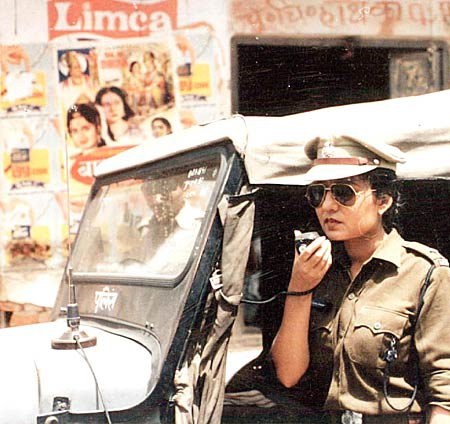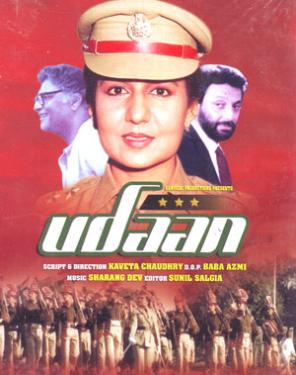
A heroine unconscious of her gender. Someone who stops a Home Minister’s car because, “I will plead no longer.. I ask for my father’s rights.” Someone who sits down her family and promises after relentless injustice has deprived them all of not just their land but their dignity in the courts and police stations, “I will go back to these offices..but not as a supplicant. I will go as someone in power. I won’t let myself or you be ordinary.” Someone who is laughed at in the police academy for her inability to scale a wall but then remembers herself asking her father as a child, “What if we fail?” And him saying, “Then we try harder.” And so she does and scales the wall. And then that moment when she walks through the corridors of the court house where her father is still fighting a losing battle. That moment when ASP Kalyani Singh (Kavita Chaudhary) walks in her uniform towards her father. Answering salutes, her eyes misting over as her Baba (Vikram Ghokhale) smiles at her with pride and nods as if to say, “You did it!”
**
And then that chowki she drives into, pulling up constables for being rude to ordinary people, setting systems in place to root corruption and laziness out, braving subtle discrimination, braving lack of trust and then that unforgettable scene of a quiet, impoverished village baking under the afternoon sun. Acting on a tip from an informer, Kalyani and two constables stop their jeep a few paces away from the village and surround a hut, hoping to catch a dreaded dacoit who has been eluding the police force for over 10 years. A stumble, a mistake and both the constables are dragged in and are about to be killed when she rams the speeding jeep into the mud and thatch structure, grapples physically with the dacoit and then chases and guns him down.
**
When was the last time you saw a woman do this in cinema or TV? When was the last time you saw a women playing the hero, credibly, powerfully, sensitively? The year I last saw a woman like that was 1991 and not in an entertaining Bollywood film but Udaan, a realistic television series based on the life of a real cop who just happened to be a woman. The cop was Kanchan Chaudhary Bhattacharya, the country’s first woman Director General of Police. and the IPS officer in the series was played by her sister, writer, actor and director Kavita Choudhary.
**
This, as you can guess was much before we began to celebrate the Kathryn Bigelows and Jessica Chastains for showing us a woman’s relationship with power. What was most remarkable about the story was its understanding of the kind of milieu Kalyani Singh emerged from. The milieu that still throws up surprise success stories when we hear of a rickshaw puller’s daughter becoming an administrative officer or a daily wage worker’s daughter becoming an international athlete. The milieu of deprivations, lacks, poverty where basic dignity and respect are denied to citizens if they do not have money or clout or fame and are dehumanised whenever they come in the contact of judiciary, police and politics. The children of this milieu having been denied even the basic things their more affluent peers take for granted often grow up with a burning desire to prove themselves. Just like Kanchan Chaudhary Bhattacharya who saw her father being brutally beaten over a land dispute and decided that she will someday help victims of ineffectual policing, corruption and lawlessness by wearing a uniform. And she did.
**
The series also uncannily presaged the issues that are only now being discussed in mainstream media. The gender bias that celebrates sons and stymies daughters about which Kalyani once says, “Self esteem can only come from self-dependence ..then why is it denied to girls? Do birds teach only their male babies to fly and restrict the females to the nest?” Aware acutely of the brutality and insensitivity in the police force, Kalyani also repeatedly tries to teach her subordinates to be gentle with people who have nothing, be they women victims who are blamed for the crimes against them, poor farmers who keep asking for their FIRs to be filed but are turned away and men like her father who are sometimes attacked and threatened for trying to fight for what has been unjustly taken away.
**
**
The story also subtly addressed issues like parents not educating girls, marrying them off early, not supporting them through instances of domestic violence and then losing them to an “accidental stove burst,” the hopeless poverty and ignorance in villages where children starve, water is scarce and empathetic governance is missing. Kalyani also encounters gender discrimination against women at work and tries to counter it by over delivering results and then is accused of being over enthusiastic.
**
Her beautiful relationship with her role model, her idealistic father who teaches her to defy circumstances and stand tall and fight but ethically. And her love story with a charismatic district magistrate (Shekhar Kapoor) who woos her like an equal, acknowledging her idealism, her drive and also her vulnerability in a world where everything is not as perfect as she would like it to be. The dialogue was breathtaking, each line, part poetry, part conversation and so real that you felt you were not watching a story but living it. The music by Sharang Dev, the authentic dialects, well researched slices of policing and what it entails when you are upright but the system is not, rural India at its best and worst, all created a narrative that cannot be bettered by anything today because the spirit to do something this pathbreaking has gone out of Indian television.
**
The story of the second IPS officer in the country (after Kiran Bedi), who went on to become the Uttarakhand DGP, is more relevant than ever before today because our cinema and television serials have lost sight of women who are thinking individuals, ambitious and inspiring. We need more women who can fly to show us how it is done. For those who want to rediscover it, the series is available in DVD format on Flipkart to remind us what the girl child can achieve even in an unequal society if she is treated with respect within her own family and allowed to soar, with her wings intact.
**
 with The New Indian Express
with The New Indian Express
Reema Moudgil works for The New Indian Express, Bangalore, is the author of Perfect Eight, the editor of Chicken Soup for the Soul-Indian Women, an artist, a former RJ and a mother. She dreams of a cottage of her own that opens to a garden and where she can write more books, paint, listen to music and just be.








 with
with
Beautifully worded yet again 🙂 It remains special not only for the namesake but for the struggles..of a different kind…Will order out the DVD set right away. Thanks for that info too besides the nostalgia.
welcome kalyani!
We all have a fragment of ‘Kalyani’ in us..we all have faced similar challenges..times haven’t changed..we still have to fight a battle each day to win our well deserved esteem…Udaan abhi baaki hai..
Nice piece. id forgotten Udaan. Shall be ordering the DVD too.
Hi reema 🙂
I chanced upon udaan last weekend, on Youtube and laughed and cried and felt inspired mostly, through it all. Its been a week since I finished all 30 episodes, and I choke with pride still as i think about it.
Thank you kavita chaudhary and udaan team!!!!!!
I agree, nothing comes close to udaan.
I have a freind who has cleared the state selection board exam, her dad was an auto driver. Thank you so much for mentioning its available on flipkart, I can’t wait to buy it for her. And for me, and for my little neice.
Thank you for writing this beautiful article!
Alka sharma